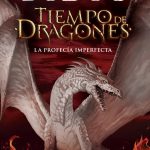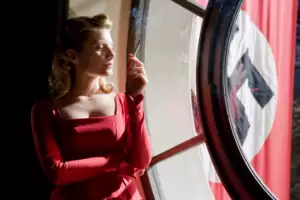They are 17 monks and they will die when the day dawns. They know well that nothing can be done to delay their destiny. So, since there’s no salvation, they decide to change what will be told in years or centuries. And to do so, they use the best weapon: fiction. They invent a prophecy, with fervor and doubts, but resolutely. Victoriously, their invention is confused with what really happened.
Fiction has also disrupted the scope of reality in the life of Liliana Bodoc. When the mendocinian writer published her first novel, Los días del Venado (The days of the deer), part of the Saga de los Confines, a fiction which combines the epic pulse of Tolkien in the mouth of Latin American soil – demonstrated what she is: an exquisite storyteller. And her fiction brought her a new reality, the possibility to become a full time writer, and eventually one of the most widely read and admired writers of Argentina.
Today, with a dozen books, Bodoc has returned to the genre with Tiempo de Dragones: the imperfect prophecy, the beginning of a new saga that will have its cinematic counterpart and visual imagery in charge of the artist Ciruelo. As a consequence of the celebration of the 2015 Writing Week of Godoy Cruz, she will talk about her new composition next Friday at 20:30, in the auditorium of the Rectory of the UNCuyo.
INMendoza.com anticipates Liliana Bodoc’s views about her book and those that preceded it.
-Time of dragons was born as a screenplay. How was that process?
Before all, «Ay!», to account for the complexity it was for me, a learning full of challenges. Time of dragons began as a film script, but almost immediately the story claimed space. So it became a novel, a saga indeed. Certainly, many of the things that appeared in the writing of the novel will move to the script. And I think that is good. I’m also very grateful for the team’s patience as they had to wait more time than the estimated at the beginning. In that way, I look like the bricklayers!
-What do you feel knowing that what came out of a paper has become a film directed by Diego Helman?
– The world of film production is totally alien to me. The ability to pass a narrative to a film record causes me intense emotion. The film always amazes me: the economy of the image, the power of the moment, the ability to embrace in a few seconds what a writer took many pages! For the first time my narrative is closed to the screen.
– Did you feel the demand of some of your readers to return to these worlds, the ones offered in the Saga de los Confines?
– Let’s see … There are readers who demand more sequels of los Confines, and maybe they will continue doing so. And I thank them sincerely. I don’t know if this new world will achieve detachment. I came back to the fantastic saga with joy, and with some trepidation to recreate another imaginary. But once I started walking through the streets of Oras Viitor, once I learned to talk to Mare Limba, a sorceress, I started to feel at home.
– In Tiempo de Dragones: the imperfect prophecy in which dragons have a dazzling presence, but still they don’t deploy their power…
– Absolutely, the dragons play a decisive role in the development of the plot but not in a conclusive way, and that barely changes. I treat dragons with utmost respect because I think, huge as they are, can destroy a human being with one flapping. So I try to be cautious with their appearances. I like them as horizon, as well as a threat, as hope, as symbols …
– You’re directing in channel Encuentro the program Los confines de la palabra, how do you feel in that field?
– The program will take four episodes. It is based on some of the issues that are repeated in my writing: poetry, freedom, death and memory. In each program there will be guests to present their views and experiences on these issues. The approach is not academic but experiential and proposes an approach to internal and emotional aspects of artistic creation. How do I feel? Weird. It is impossible to ignore that it’s new for me. I get along with it thinking it’s going to be like any of my meetings with readers: simple and familiar.
-Almost 15 years has passed since the publication of Los días del Venado, how do you see it from a contemporary look and how do you narrate everything that you have been living until today as an effect of it?
Of course I don’t reread my work. But I don’t need to do it to know that today Los días del Venado would be another novel, another script. Maybe, more simple and a little more skeptical. The truth however, is that if I hadn’t written then I wouldn’t has been answering this question today. Fifteen years now, and it’s still alive. What else can I ask for? From that time until today my life changed in formal aspects, my agenda for example, and the way people participate and interact in my lectures . I thank each one of those moments, those readings. I appreciate the huge opportunity to make a living through my writing. In return, when I attempt to talk to God, I commit myself with honesty and passion.









